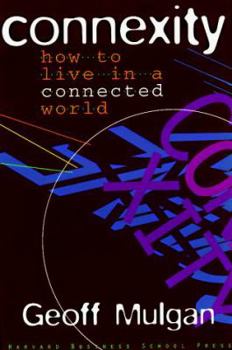Connexity
Select Format
Select Condition 
Book Overview
Analyzes the increasing interdependence of the world's markets, politics, and technology, showing how the progress of global connectedness depends on the advance of individual freedom across the... This description may be from another edition of this product.
Format:Paperback
Language:English
ISBN:0875848508
ISBN13:9780875848501
Release Date:June 1998
Publisher:Harvard Business Review Press
Length:268 Pages
Weight:0.78 lbs.
Dimensions:0.9" x 5.5" x 8.0"
Customer Reviews
3 ratings
An analysis of where society is and where it may go...
Published by Thriftbooks.com User , 24 years ago
First, this book is absolutely spectacular. Well thought out and thoroughly presented.If you expect to interact with people and exchange information, you need to read this book. Being part of society is what makes societies and governments function. Without some level of connection/involvement between people, nothing would be accomplished.Read and re-read... it will change the way you think, and even possibly make you a more enriched person...
invaluable and different taste
Published by Thriftbooks.com User , 26 years ago
Connexity presents invaluable and different tastes from the windows of Mulgan. While reading this book, you feel yourself in the jungle of real life.
Great read. Low on hype and long on rational thought.
Published by Thriftbooks.com User , 26 years ago
Mulgan asks "are the achievements of freedom and the growth of independence compatible, or are we doomed to a classical tragedy in which our love of freedom destroys our capacity to be independent?" He then argues both sides of this question from an economic, sociological, and moral perspective.In the end, the moral imperative of reciprocity (give and take, the golden mean) fuels his optimism for a self-organizing moral and societal order without the constraints of traditional methods of governance. However, Mulgan is no Pollyanna. He concludes with an optimistic view of the future tempered with a dash of realism. "The classical idea of progress as the unfolding of a grand plan or the expression of a higher intelligence is as doubtful as the much more recent faith that the world might have immanent properties that drive it towards complexity, integration, and self-organization. [...] There may be no destiny, and no certainty, nothing determined, only choices and chances. But life is all the better for that, because that is what leaves room for people to make their own history."Mulgan's explanation of how we arrived at this point in the history of the world makes his analysis of the future more credible. For most of human history, a few traders linked the great trade centers but most economic life was local, face-to-face, and small scale. Larger social units were broadly defined and self-contained. Each unit could be mapped as a series of concentric circles of decreasing power radiating from the centers. Citizens at the centers of power were more cosmopolitan by virtue of their connectivity with other centers of power while residents of the distant regions were provincial.The rise of rapid, economical, and global travel and digital communication (connexity) has reduced the hold of provincialism upon the outlying citizens and enabled a more cosmopolitan attitude to permeate throughout society. The trade networks and free-flowing information that liberated people f! rom the previous bonds of settled agriculture and industry produced a modern nomadic mobility. On the downside, connectivity promotes a sense of timeless time and of spaceless space that favors economic transactions over relationships and withdrawal from communities rather than staying engaged.Mulgan contends that our freedom is intimately linked with that of the State. Fortunately, the State's very success in delivering both external and internal security has made new forms of government possible. Much of the baggage of sovereignty and power that that we have inherited from the days when the main role of government was to protect us from danger is now obsolete. Mulgan explores the impact of discarding this baggage (taxation, social order and control, and bureaucracy) in discussion of the rise of the city-state, assumption of pseudo-governmental roles for global corporations, and the relegation of national governments to figurehead status. Whatever form the new social orde





